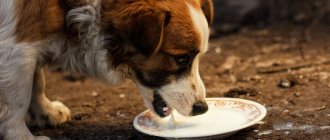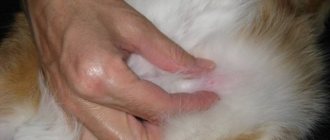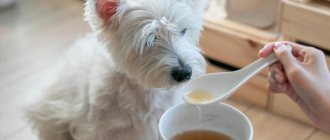What kind of eggs can you give?
Eggs are allowed to be included in the diet if the pet has been on natural food since birth. It is important to follow the product norm so as not to cause harm.
Which ones are possible:
- The most popular and affordable are chicken and quail eggs. They have the composition necessary for the growth and development of dogs of all breeds.
- If possible, add goose or duck eggs to the diet.
- Ostrich is quite large, it is allowed to give it 0.5 at a time.
Each type contains fats, proteins and carbohydrates necessary for the growth and development of the animal. They are given both whole and separately from the shell. Allowed to cook and add to other dishes.
Egg composition:
- calcium;
- vitamin A, E, D, PP;
- B vitamins;
- potassium;
- phosphorus;
- magnesium;
- iron.
Vitamins and microelements are necessary to maintain the health of your pet, strengthen bones and teeth. When there is a sufficient amount of them in the animal’s body, the dog’s fur becomes silky, shiny, and stops falling out.
Raw
Pet owners are wondering whether it is possible to give raw chicken eggs to their pets. Concerns relate to the risk of contracting salmonellosis.
It has been scientifically proven that dogs have short intestines and higher acidity than humans. Therefore, the likelihood of getting sick is minimal.
A raw egg can cause allergic reactions, so it should be introduced into your pet's diet carefully. Do not give the product to dogs in old age. This is due to a weak immune system.
Boiled
Boiled eggs are no less healthy than raw ones. It is a source of protein, and the yolk contains fats needed for growth and development. The body absorbs such food by 91%.
If the owner doubts the quality of a raw egg, heat treatment will help kill harmful bacteria. You shouldn't give up the product completely .
Fried
You should not feed your dog fried eggs.
They contain cholesterol that is harmful to the dog’s body. Large amounts of fat negatively affect the functioning of the intestines and pancreas. Fried chicken eggs are not digested by the body, thereby complicating the work of the liver and heart. There is a high probability of developing pancreatitis.
Can dogs have eggs? Eggs in the diet of dogs.
Eggs are a very nutritious food. They are a good source of protein, which is necessary for renewing muscle tissue and strengthening the coat. Eggs contain a lot of folic acid, amino acids and minerals (iron and selenium), vitamins (particularly a, D and B 12.
Since a dog is a carnivore by nature, the basis of the diet should be protein products. Bird eggs are well absorbed by the dog's body. Of all the products based on protein, they have the highest biological value (even compared to meat. The distant ancestors of our dogs, wolves, did not miss the opportunity to feast on a clutch of eggs. What kind of eggs can be given to dogs? The most accessible today are chicken and quail eggs. But, if you or someone you know has a farm, then it will be just great if your pet eats duck, goose, turkey, and even ostrich eggs. But since all eggs are still different in size, then The weekly number of eggs should be regulated, focusing specifically on chicken eggs. How often can dogs be given eggs? The frequency of feeding a dog eggs depends on the age and size of the animal. It is recommended to give an adult, medium-sized dog 1-2 chicken eggs per week. Quail eggs are smaller, therefore they can be given more often, for example, 1-2 times a week, 2 pieces at a time, or one egg 2-4 times a week.Goose and duck eggs are larger than chicken eggs, so they need to be given less. Well, what can we say about the huge ostriches! One such egg can feed your dog, yourself, and even your neighbors at once! It is very useful to give quail eggs to male dogs about a week before the planned mating (one testicle per day on an empty stomach. After all, this leads to increased blood circulation in the organs of the animal responsible for procreation. Quail eggs are distinguished by a richer vitamin composition than chicken eggs, and in their protein there is a larger amount of protein. Why eggs can be dangerous. Despite the apparent benefits, eating eggs can cause adverse reactions in the body and even harm the health of the four-legged: - In rare cases, a dog may experience individual intolerance and food allergies to this product. Symptoms will be noticeable almost immediately. Redness is observed in the area of the ears, groin and armpits, and the animal begins to itch. Therefore, one or another product must be introduced into the dog’s diet gradually, observing the body’s reaction for at least a couple of days to make sure that the body reacts normally, or The point is that the allergy is caused by this particular product. — If you frequently feed eggs, increased gas formation may occur. This will be especially noticeable if the pet does not live on the street, but with you in the apartment. Any, even the most healthy product, if used incorrectly, can cause a serious illness. It's the same story with eggs. Eggs contain a sufficient amount of cholesterol, and if they are offered to your pet more often than recommended, then an excess of cholesterol in the body can cause blockage of blood vessels. — Raw eggs can contain bacteria that can cause such a serious disease as salmonellosis. Sometimes you can hear the statement that by eating raw quail eggs it is impossible to become infected with salmonellosis, since due to the high body temperature, quails are not susceptible to this disease. But this statement is incorrect. Quails can also suffer from pullorosis (a disease from the group of salmonellosis. It is for this reason that many veterinarians do not recommend introducing raw eggs into the diet of pets, unless the animal owners are completely confident in the quality of the eggs. But on the other hand, dogs have a short gastrointestinal tract intestinal tract and increased acidity, as a result of which they are more resistant to salmonellosis than humans. - You can often hear that dogs should not be given raw egg whites, since they contain a protein such as avidin, which prevents the body from absorbing biotin (a B vitamin), glucose and amino acids. Lack of biotin leads to hair loss and skin inflammation. But on the other hand, raw egg white is very important for cell growth and promotes fatty acid metabolism. In fact, egg white can only cause biotin deficiency if the dog will eat a huge amount of raw eggs... Moreover, the egg yolk, as well as foods such as carrots and liver, more than compensate for this deficiency. It follows that animals whose diet is balanced can safely be fed raw egg whites in reasonable quantities. — Raw eggs are not recommended for giving to sick animals with weakened immune systems, or to puppies whose immunity has not yet fully developed. Is it possible to feed eggshells to dogs? Yes, you can! In addition to the benefits of the eggs themselves, eggshells are 90% calcium, which is perfectly absorbed by the animal’s body and helps strengthen teeth, bones and joints. In addition to calcium, the shell contains about 27 useful microelements, such as fluorine, iron, phosphorus, sulfur, zinc, magnesium, which improve the condition of the pet’s skin and coat. It is best to grind the shells and mix them with the main food. Attention! Only if you give the dog a whole shell, then there is a risk that when chewing, small pieces may get stuck between the teeth and in the animal’s throat. Raw or cooked? Both raw and boiled eggs are good for dogs. This is an excellent source of protein for the body. However, studies have shown that the digestibility of boiled eggs is 91%, and raw - 50% over a 24-hour period. Many dog owners adhere to the following rule: use the same type of food and give the pet eggs in the same form as all other food. That is, if the dog is accustomed to boiled food, then it needs to boil eggs. If the four-legged animal is fed raw meat, then the eggs are given raw, trying to take them only from trusted producers. But, it must be said, there have never been cases of inability to digest a raw egg in combination with boiled meat and vice versa. Both raw and boiled eggs can be added to meat (both raw and boiled) and fermented milk feeding, and just give them to your pet to enjoy separately. But you should not give fried eggs to your dog, as they contain excess fat, and their consumption can cause pancreatitis. Only if you really want to pamper your beloved pet, then prepare him a steamed omelet.
Nutrition standards
You are allowed to feed your dog an egg once a week. The portion depends on the age and size of the dog, its immunity.
Norm for one feeding:
- Small dogs and puppies up to 3 months – 1/3 chicken, or 2 quail.
- For adult pets – 1 whole, or 4-5 quail.
- For older dogs – no more than 1 whole.
Goose and duck eggs are quite large and cannot be given whole. The norm can be measured in tablespoons: 1 egg – 3 tbsp.
How often to feed per week:
- pregnant and lactating women – 2 times;
- older dogs – 1 time;
- puppies – 1 time.
Quail is especially useful before mating, as it increases blood circulation. In this case, it is allowed to add 1 piece to the dog's food. 3-4 times a week .
It is necessary to follow the nutritional norm, ensure that the diet is balanced and varied. Overeating leads to constipation and intestinal dysfunction. It is better to add raw eggs to minced meat for cooking or to porridge during cooking.
Som
The Old Testament recognizes only fish covered with scales as edible. All others are considered “unclean”, including catfish. The famous ethnographer Vladimir Dal, in his essay “On Beliefs, Superstitions and Prejudices of the Russian People” (Moscow, published in 1880), pointed out that peasants call this fish “devil’s horse.” One of the reasons for the negative attitude towards catfish is its diet. This river predator does not disdain frogs, and also eats the meat of drowned people, playing the role of a scavenger in the aquatic ecosystem.
Feeding eggs to puppies
Feeding the puppy raw eggs begins in the first month of life. To do this, add one egg to 500 ml of milk and stir thoroughly. The mixture is enough to feed 5-6 small puppies.
From 3 months, the product is added to main dishes, for example, minced meat, porridge. If the puppy eats dry food and the owners do not plan to switch it to natural food, eggs should not be given.
Feeding newborn puppies with this product is allowed once a week.
During this period, it is necessary to closely monitor the dog's condition. When introducing quail eggs, the quantity is doubled due to their size.
conclusions
Eggs are very beneficial for dogs, but in larger quantities they are harmful. Puppies are given finely diced boiled egg product 1-2 times a week. The raw ones are given the yolk mixed with cottage cheese. Beware of allergies. Boiled foods are absorbed much more efficiently. Eggs should be given no more than 1-2 times a week.
Please follow and like us:
Nikitin Sergey
I write about dogs based on the experience and knowledge gained during my studies as a veterinarian, work in my specialty, and simply from observing my pets.
Benefit
Eggs contain beneficial substances that help the animal's body function. The product is indispensable in a dog’s diet, but subject to established standards.
Beneficial features:
- almost completely absorbed by the body: raw by 50%, cooked by 91%;
- have high value for the operation of internal systems;
- have a beneficial effect on the central nervous system;
- increase immunity;
- contain amino acids and fats important for your pet;
- are a natural remedy against vitamin deficiency in spring and autumn;
- supply with vitamin D;
- improve blood circulation, which helps male dogs during the mating period;
- regulate the level of hemoglobin in the blood;
- a source of calcium necessary for teeth and bones.
The pet's coat improves: it becomes shiny and silky. Calcium improves teeth and prevents caries.
Harm
Eggs are contraindicated for pets that eat dry food. This leads to indigestion and pancreatitis.
Harm:
- Allergy to the product. It manifests itself in the form of itching, dermatitis, and urticaria. The animal becomes restless.
- Individual intolerance to the product is expressed in increased sweating and odor from the ears.
- A large amount of cholesterol leads to blockage of blood vessels and the formation of blood clots.
- Causes bloating and increased gas formation.
- The protein interferes with the production of biotin, which is responsible for the quality of the skin and coat.
- Infection with salmonellosis when introducing fresh product into the diet.
Many people believe that dogs cannot get salmonella, but this is not true. Bacteria enter the animal's body along with food.
Symptoms of an intestinal infection in a pet:
- body temperature above +40°C;
- vomit;
- diarrhea mixed with blood;
- weight loss;
- convulsions.
The body becomes exhausted and internal hemorrhage occurs. Untimely treatment leads to the death of the pet.
Allergy
Allergies are a common reaction in dogs to chicken eggs. Signs of a food rash are visible almost immediately.
Symptoms:
- the dog constantly scratches its ears, rubs its body against objects, chews its paws;
- clear mucus flows from the nose;
- tear production increases;
- peeling and small cracks appear on the paw pads;
- hair falls out, bald spots appear;
- gastric emptying becomes more frequent and stool changes.
If your pet is allergic, it may cause an unpleasant odor from the mouth due to fermentation in the intestines.
This reaction of the body can lead to dehydration, respiratory arrest, and swelling of internal organs. The dog may develop anaphylactic shock, which, if not treated in a timely manner, causes the death of the pet.
What to do if the dog becomes ill?
Each new product is introduced into the dog’s diet gradually and in small portions. Poisoning is possible in puppies and adults.
First aid for an animal:
- Try to induce vomiting. This will help clear the stomach of eaten food.
- Give more clean water to drink. If the dog does not drink on its own, use a pipette.
- To maintain the water-salt balance, dilute 1 tbsp per 250 ml of water. salt and pour into the mouth in small portions.
- Give your pet activated carbon. The norm is 1 tablet per 1 kg of weight.
- Take your pet to a veterinarian where he will receive medical care. You can call a doctor at home.
It is important to monitor the dog’s well-being and help him in time. Poisoning and dehydration can be fatal.
Eggshells for dogs
It is allowed to give raw eggs with shells. The product is well absorbed by the animal’s body, saturating it with calcium.
Boiled shells, finely crushed, can be given without fear for the health of your pet. To protect the animal from salmonellosis, it is recommended to soak the egg for about 15 minutes in a weak vinegar solution.
Microelements included in the shell:
- calcium;
- fluorine;
- iron;
- sulfur;
- zinc;
- magnesium.
Microelements improve the quality of teeth and wool.
The shell is especially useful for dogs at an early age, when the bone skeleton is being formed.
In the dog's diet, the shells are ground into fine grits or flour. This allows you to avoid sharp fragments getting between your teeth when chewing.
The shell is added to ready-made dishes and soups. For quail eggs, it is quite thin and does not need to be crushed.
When introducing such a product into your pet’s diet, it is important to monitor its condition. Excess calcium is harmful to the body . It leads to osteochondrosis, disruption of the musculoskeletal system. If your dog has enough calcium in his diet, it is not recommended to feed him egg shells.
Quail eggs for a dog. Benefit
Perhaps no one will argue that chicken and quail eggs are a very healthy product. They contain amino acids, vitamins and other substances. One of the main advantages of the product is its easy digestibility. After introducing treats into the diet, dogs' immunity and coat condition improves: peeling goes away and shine appears.
The shell also contains protein and calcium. You can give your dog some egg shell powder. However, you should not get carried away, since excess minerals interfere with the absorption of other microelements.
It is recommended to add quail eggs to the diet of male dogs before mating. The course starts about a week in advance. Every day the dog is given 1 egg, preferably on an empty stomach. This increases blood circulation in the groin area and helps your pet recover faster.
What to replace it with?
If a pet is allergic to eggs, then the product must be excluded from the diet. The owners replace the allergen with cereals, bones, and vegetables.
What to replace:
- fresh cottage cheese and sour cream contain calcium;
- milk is rich in protein and calcium;
- boiled and fresh vegetables are rich in vitamins and microelements;
- legumes, soybeans – a source of protein;
- fruits are vitamins and minerals.
Chicken eggs are replaced with goose, duck, and quail eggs. In any case, it is important to observe portions and feed dogs correctly.
Goose and duck
Goose and duck are slightly larger than chicken, but have a similar composition. Rich in vitamins and microelements, they are a source of protein necessary for the development of a pet.
How much to give:
- for puppies and medium breeds – half;
- large breeds - whole.
Often consumption is harmful to the pet's body . Do not exceed the norm and give the product daily.











